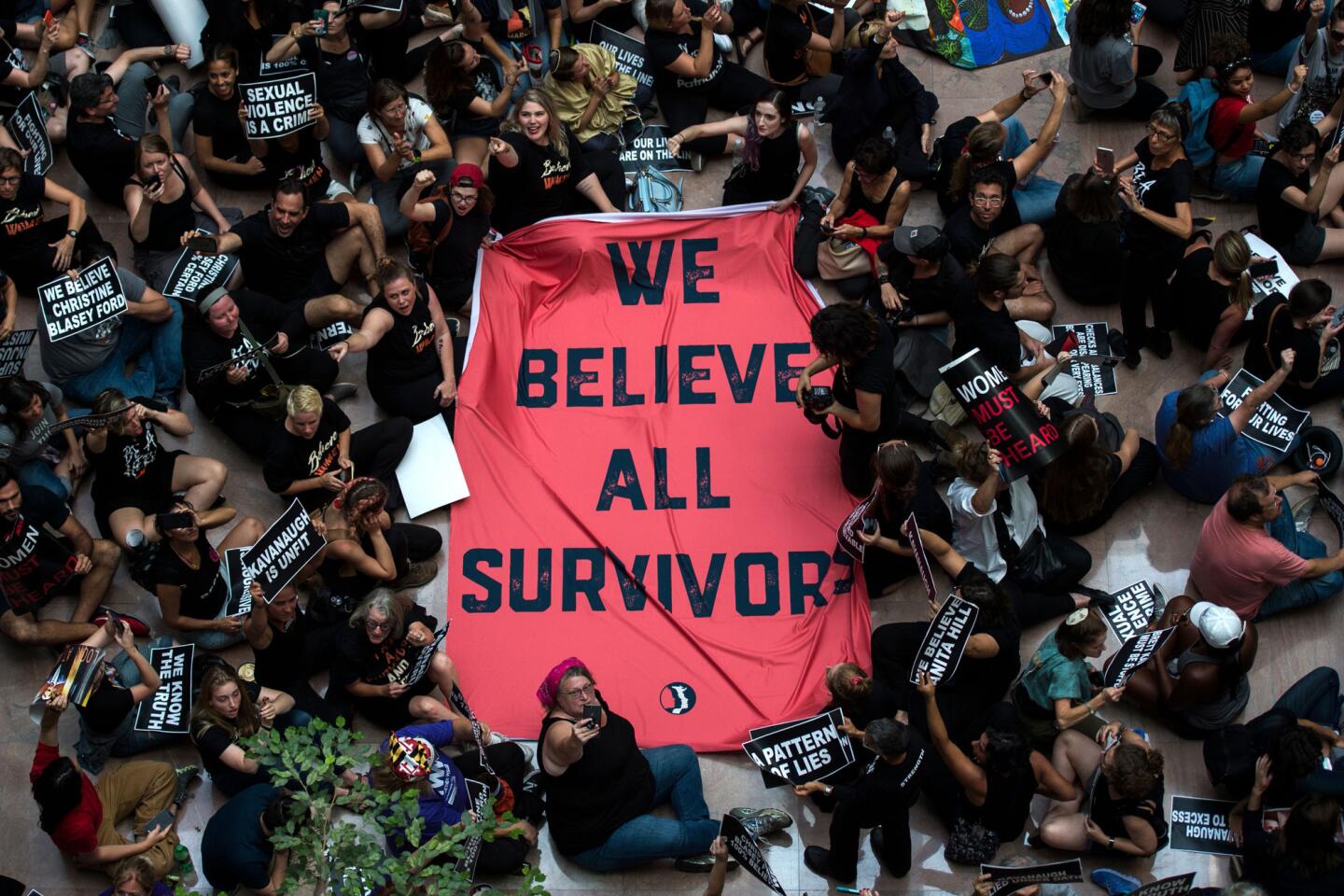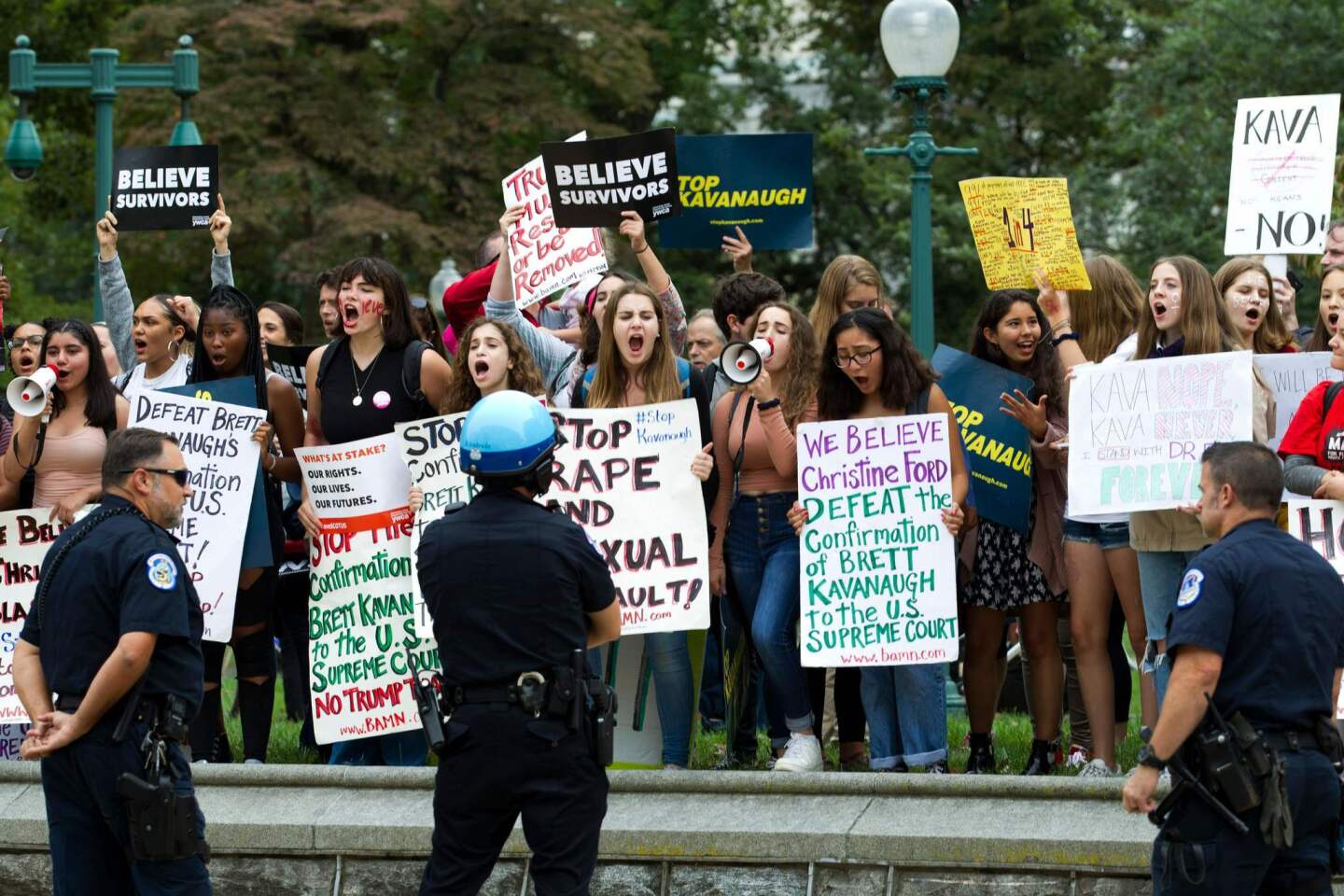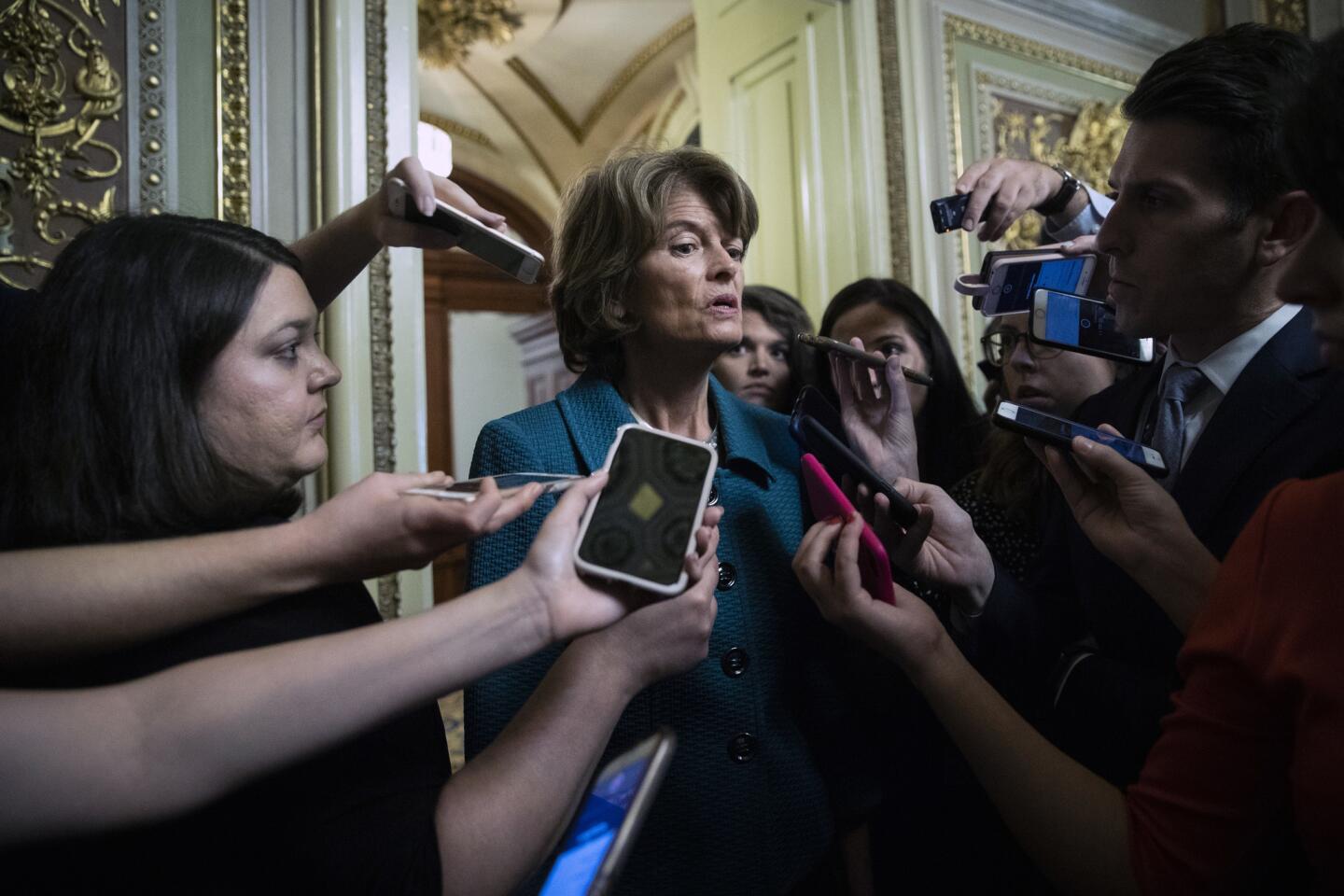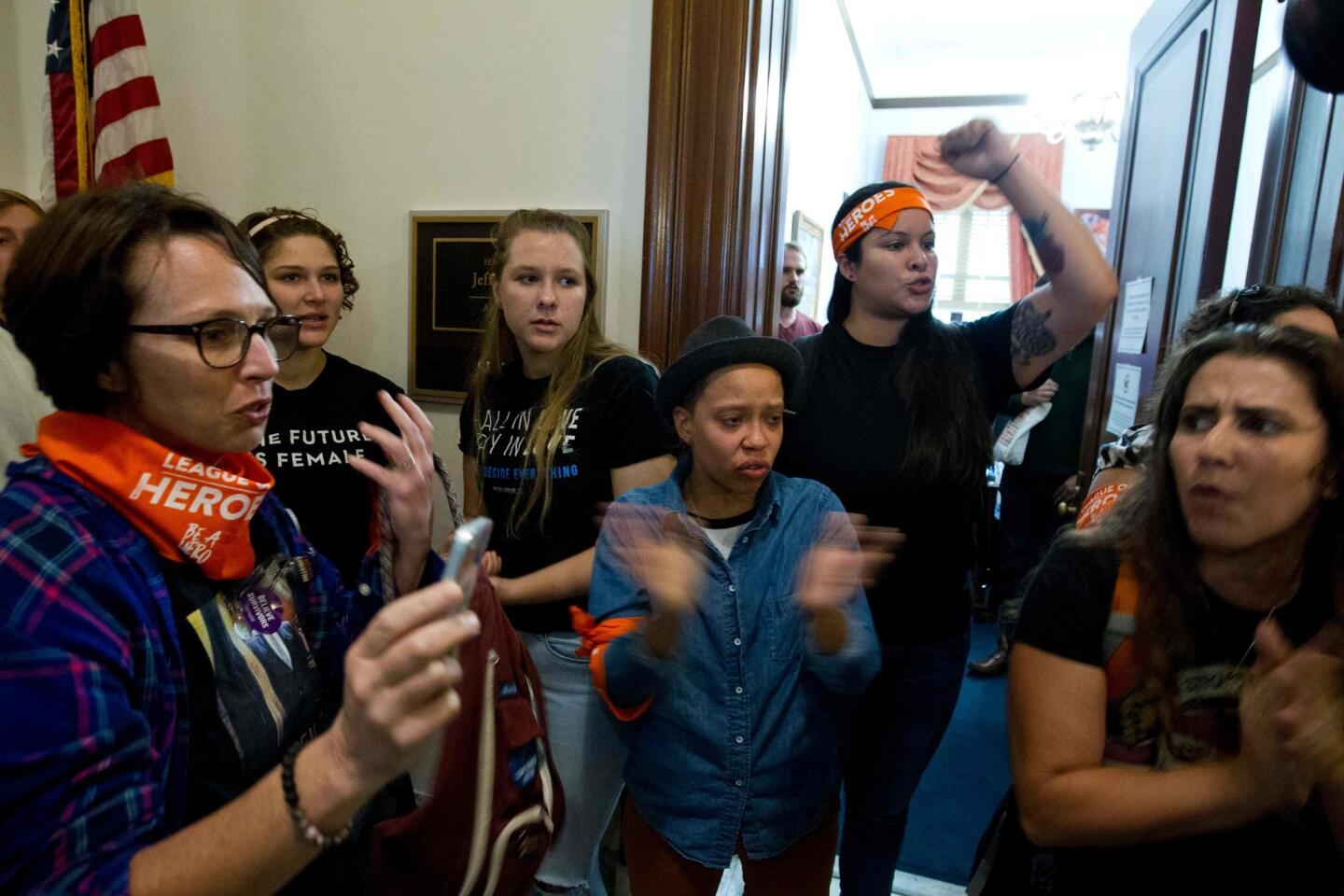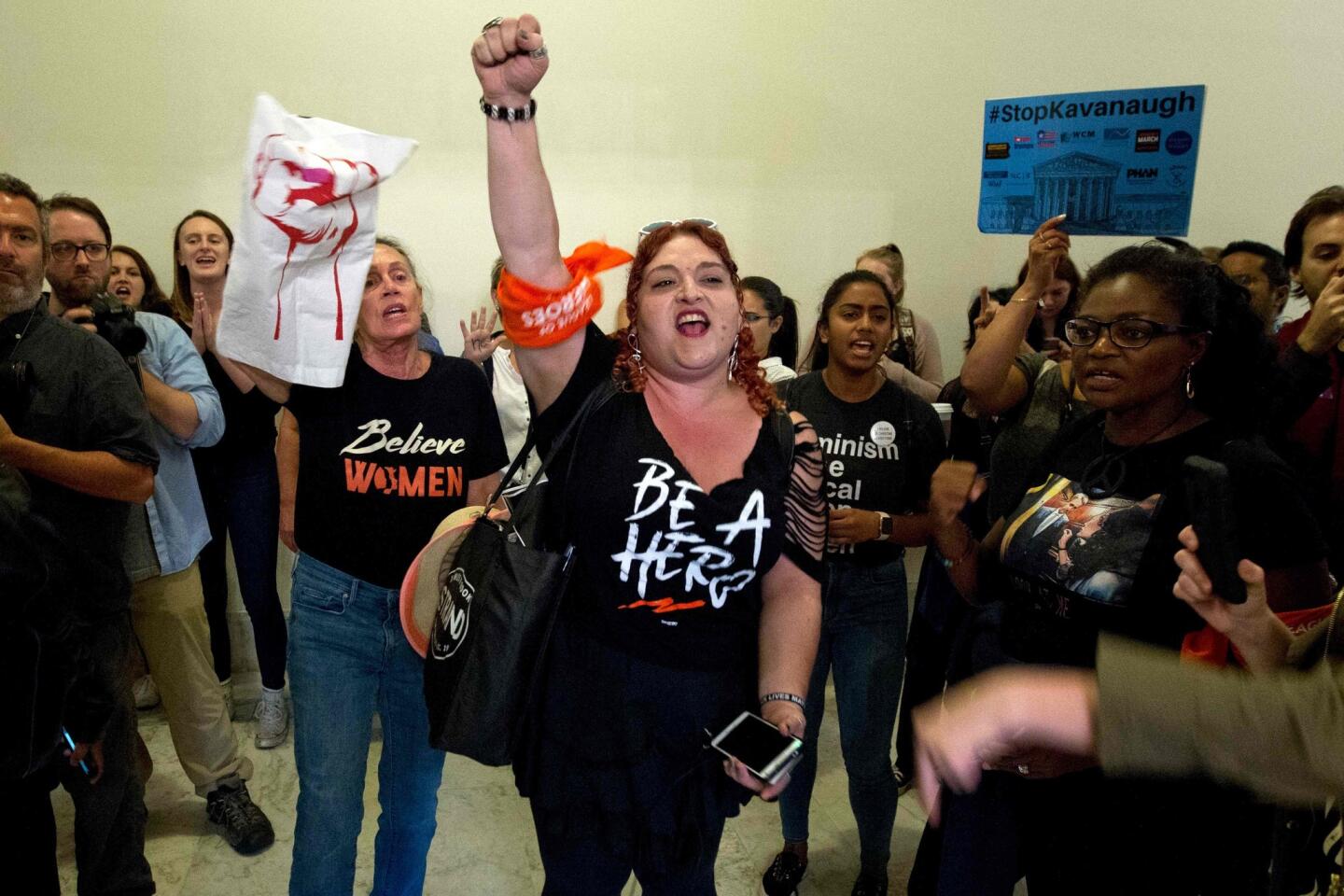Supreme Court nominee Brett Kavanaugh headed for confirmation on Saturday
- Share via
Reporting from Washington — Judge Brett Kavanaugh is poised to win Senate approval Saturday to become the fifth solid conservative on the U.S. Supreme Court, ending one of the ugliest, most partisan confirmation battles in modern history.
Kavanaugh’s path to the nation’s highest court was cleared Friday afternoon after two key undecided lawmakers, Sens. Susan Collins (R-Maine) and Joe Manchin III (D-W.Va.), announced they would support him in the final vote.
The nomination, once seen as a safe bet in the Republican-controlled Senate, almost derailed when multiple women accused Kavanaugh of decades-old sexual assault and misconduct, turning the confirmation process into a referendum on the political power of the #MeToo movement.
Kavanaugh, who now sits on the D.C. Circuit Court of Appeals, denied the allegations and conservatives rallied behind him.
But the nomination unleashed fierce passions across the nation and particularly on Capitol Hill, where hundreds of protesters have swarmed government office buildings and confronted wavering senators in recent days.
Partisan rancor left over from the fight could throw a wild card into the midterm election in November, potentially energizing voters on both the left and the right. Suburban women, in particular, are expected to play a crucial role in which party controls the House, and possibly the Senate.
Although Collins was widely considered a swing vote, she ultimately delivered a full-throated, 40-minute endorsement of Kavanaugh, praising his record and raising questions about the allegations against him.
“I do not believe that these charges can fairly prevent Judge Kavanaugh from serving on the court,” she said.
Top presidential aides burst out in applause in the West Wing while watching Collins’ speech, according to an administration official. Among the celebrants was White House Counsel Donald McGahn, a fixture of the conservative legal scene and the principle shepherd of Trump’s judicial nominees.
Kavanaugh’s ascent would mark another victory for Trump and Senate Majority Leader Mitch McConnell, who have transformed federal courts by nominating and confirming an unprecedented number of conservative judges.
Shortly after Collins delivered her speech on the Senate floor, Manchin said he would support Kavanaugh as well. Manchin, a Democrat facing a tough reelection fight in a conservative state, said he was assured that Kavanaugh would carefully consider any cases that could imperil healthcare protections for patients with preexisting conditions, a crucial part of President Obama’s landmark legislation, the Affordable Care Act.
“Judge Kavanaugh assured me personally that he would consider the human impacts and approach any decision with surgical precision to avoid unintended consequences,” Manchin said in a statement.
The only Republican to oppose Kavanaugh was Sen. Lisa Murkowski of Alaska.
“I believe Brett Kavanaugh is a good man,” Murkowski told reporters afterward. “It just may be, in my view, he’s not the right man for the court at this time.” She said she worried that his confirmation battle had eroded Americans’ faith in the Supreme Court. Native Americans, a key part of her base, also opposed Kavanaugh over some of his rulings.
The toll of the bitter confirmation process — which Sen. John Kennedy (R-La.) called “a freak show” and Collins likened to a “gutter-level political campaign” — was apparent among senators. During the preliminary vote Friday, they sat at their desks and took turns standing when their names were called by a clerk, a practice typically reserved for high-profile or particularly meaningful decisions. Murkowski’s voice was barely audible when she cast her vote.
Democrats plan to keep the Senate floor open all night to give speeches in opposition to Kavanaugh’s nomination.
“This process has left the American people with more questions than answers,” said Sen. Kamala Harris (D-Calif.). “This has not been a search for the truth. The minimum standard for a Supreme Court nominee should be someone who we are confident will demonstrate impartiality, integrity and truthfulness, but the nominee we are voting on has not demonstrated those qualities.”
The final tally for Kavanaugh’s vote is expected to be 50-48-1 because Sen. Steve Daines (R-Mont.) will be attending his daughter’s wedding Saturday and Murkowski said she would vote “present” rather than “no” so that Daines could miss the vote and keep the same two-vote margin.
Kavanaugh would still squeak through the Senate by the tightest margin in the last century, even closer than when Clarence Thomas was confirmed 52 to 48 in 1991. Thomas prevailed despite facing allegations of sexual harassment from Anita Hill, a controversy that previewed Kavanaugh’s own embattled confirmation.
Christine Blasey Ford, a Palo Alto University professor, said Kavanaugh and a friend drunkenly pushed her into a room during a gathering when she was 15 and he was 17. Kavanaugh climbed on top of her and tried to remove her clothes, Ford said, covering her mouth when she tried to shout for help.
Another woman, Deborah Ramirez, said Kavanaugh exposed himself in her face while they were drinking with classmates at a Yale University dorm party.
The White House ordered a supplemental FBI background check after an explosive and emotional Sept. 27 hearing in which Ford testified on her allegations and Kavanaugh delivered an angry denial. In his testimony, Kavanaugh bitterly and tearfully blamed Democrats for conducting a “search and destroy” mission against him.
Sen. Dianne Feinstein of California, the Judiciary Committee’s ranking Democrat, said she was disturbed by Kavanaugh’s temperament and sharp partisan tone.
“We saw a man filled with anger and aggression,” Feinstein said. “This behavior revealed a hostility and a belligerence that is unbecoming of someone seeking to be elevated to the United States Supreme Court.”
In an essay published Thursday by the Wall Street Journal, Kavanaugh said he regretted parts of his opening statement and testimony, saying they reflected his frustration.
The FBI investigation, demanded by a handful of Republican senators under pressure from Democrats, lasted less than a week and involved interviews with nine people. A single copy of the confidential report was held in a secure room on Capitol Hill, and senators began reviewing it on Thursday.
Republicans said the investigation did not uncover any new corroborating evidence supporting the allegations, though several said they were moved by Ford’s story.
“I was very disturbed by the allegations that were put forth,” Collins told reporters after her speech. “I found Christine Ford’s testimony to be very heart-wrenching, painful and compelling, but there was a lack of corroborating evidence no matter where you looked.”
Democrats decried the probe as incomplete, saying FBI agents failed to talk with potential witnesses. Neither Ford nor Kavanaugh was interviewed.
A hint that Kavanaugh was heading toward confirmation came Friday morning during a preliminary vote, which passed 51 to 49.
Sen. Jeff Flake of Arizona, one of the few Republicans who had demanded the FBI investigation, voted yes on Friday morning and told reporters he would also vote for Kavanaugh over the weekend “unless something big changes.”
Trump used the fight over Kavanaugh’s nomination to rile up his supporters at a rally in Rochester, Minn., on Thursday night, drawing chants of “We want Kavanaugh” from the crowd.
“All you have to do is look at the polls over the last three or four days and it shows that their rage-fueled resistance is starting to backfire at a level that no one has ever seen before,” the president said.
Although some polls have shown increasing Republican enthusiasm ahead of the November midterm election, which will determine control of Congress, Kavanaugh’s support among voters as a whole is historically low.
Kavanaugh was named to replace former Justice Anthony M. Kennedy, a swing vote who retired this summer, and would be Trump’s second nominee to reach the court. The first, Neil M. Gorsuch, was previously confirmed to a seat that Republicans had blocked Obama from filling during his last year in office after the death of conservative Justice Antonin Scalia.
Times staff writers Noah Bierman and Eli Stokols in Washington contributed to this report.
Twitter: @jenhab, @sarahdwire and @chrismegerian
UPDATES:
6:05 p.m.: This article was updated with Murkowski’s decision to vote present.
3:30 p.m.: This article was updated with additional comments from Manchin, Harris, Collins and others.
12:50 p.m.: This article was updated with Collins’ speech.
9:25 a.m.: This article was updated with comments from Murkowski, Flake and Thune.
7:55 a.m.: This article was updated after the vote.
7:20 a.m.: This article was updated with comments by Grassley and Feinstein.
This article was originally published at 6:45 a.m.
More to Read
Get the L.A. Times Politics newsletter
Deeply reported insights into legislation, politics and policy from Sacramento, Washington and beyond. In your inbox three times per week.
You may occasionally receive promotional content from the Los Angeles Times.
